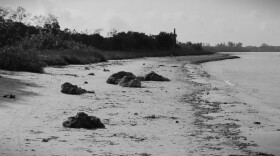-
In November alone, more than 1.7 million people living in counties along or near Southwest Florida’s Gulf Coast were plunged back into a moderate drought. And drought often precedes wildfires.
-
-
Florida is a haven for mosquitoes
-
Lake Okeechobee boaters are being alerted to a nearly 10-acre floating island that was blown into the channel Tuesday night near Route 2.The navigation channel is temporarily closed until a team from the U.S. Army Corps team can remove it.
-
National Public Lands Day is Sept. 27
-
The Pepper Ranch Preserve in Collier County is holding viewings for the native Southeastern Sunflowers, which will be in bloom this October. Visitors can drive through the 2,600 acre ranch.
-
Water experts in Florida agree, as well as take exception, to a new report that says Lake Okeechobee is the dirtiest lake in the United States.The report by Lake.com, a Canadian-based vacation rental platform offering lake houses, cabins and cottages for rent, says Lake O's top issue is visibly murky water due to turbidity levels and lead contamination.The report said that an amount of lead was detected in its most recent samples. There is no safe level of lead, and its presence in lakes is unnatural. Additionally, the report said turbidity here was the second-highest of all evaluated lakes after Utah Lake, giving the impression of rather cloudy water.
-
Animal rights groups are encouraging supporters to apply for bear hunting permits to limit the number of bears killed in December.Starting Friday, the Florida Fish and Wildlife Conservation Commission will begin accepting applications for 187 permits that will be issued for a December hunting period. The permits will be awarded through a lottery-style process and would entitle people to each kill one bear.
-
Multiple sightings of a bear on the main part of the FGCU campus in recent days has prompted the placement of a trap on campus.The University Police Department urged people stay clear of the trap. UPD asked people not approach the trap, but report — from afar — if anything is seen inside.
-
The South Florida Water Management District plans to conduct a prescribed burn of up to 800 acres in the Hickory Hammock Wildlife Management Area in Highlands County today, Thursday, August 21.
WGCU is your trusted source for news and information in Southwest Florida. We are a nonprofit public service, and your support is more critical than ever. Keep public media strong and donate now. Thank you.










